Articles of 2005
Johnson–Jeffries (Part 4): Fight of the Century
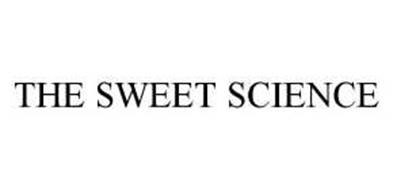
At the arena on a day that dawned spotlessly clear and with a promise of searing temperatures, as an army of drunks stumbled into the sap-perspiring arena on the outskirts of the town, the military brass band climbed into the ring and played patriotic songs. One of the “patriotic selections” was All Coons Look Alike to Me, which some of Jeffries supporters had persuaded the relatively sober musicians to play.
The crowd was not all white; an estimated 1,000 Blacks filed into Reno’s temporary arena; a few of the more intrepid were boisterous, but most were quiet, alert to danger, heart-hammering hopeful. A few days before the fight, “Black special trains” arrived from Chicago and Oklahoma City. A New Yorker named One Pin came with a party of 36. Blackie Williams brought a delegation of 35 from the state of Washington. Clarence Estelle shepherded a large group from San Francisco. They headquartered at the Johnson Club, not far from the Golden Hotel, which had been taken over by Jeffries fans. If a man had the price of a drink, a dinner, or a bed, Reno’s business community did not look at the color of his skin.
Fearing violence before the fight started, Rickard had called upon William Muldoon, a pompous, humorless and very large man, to give a speech from the ring. In a forceful voice, Muldoon, a onetime great wrestler and John L. Sullivan's former trainer, implored the fans not to judge Johnson too harshly because he was a Negro, and that regardless who won, the verdict should be accepted in a sense of fair play. Since the only beverage available was lemonade, and everyone seemed to be sobering under a scorching sun, Muldoon's speech was accepted without too many catcalls. It should be noted that it was Muldoon who unnerved Jeffries the most at his training camp with his never?ending plea: “Jim, you must win for the white race. You MUST.”
Before the fight, Uncle Billy Jordan, the leading ring announcer of his day, boldly introduced Jeffries “as the great white unbeaten heavyweight champion of the world”, which did little to lessen Johnson's desire to beat the devil out of his bronzed opponent. Johnson had asked Rickard not to permit that announcement, but Rickard had opted for personal safety and ignored his plea.
Johnson was the champion, but he only shrugged when they told him Jeffries had demanded to enter the ring last. With his patented smile firmly in place, and wearing a gray silk robe and royal blue tights held up by an American-flag belt, Johnson was first into the ring. There was only one shady corner and Johnson laid claim to it. When it was Jeffries turn, he entered wearing a gray business suit and gray golf cap, which he quickly shed, revealing a pair of natty purple trunks and an American-flag belt. Their gloves were skintight leather and weighed four ounces each. By the time both men were in the huge 28-foot ring, it was estimated that the day's temperature had hit 110 degrees. After Jeffries made his grand entrance, he went to Johnson and asked if he would mind tossing a coin to see which got the shady corner. Johnson declined to toss, but then he graciously offered the corner to Jeffries, who quickly took it. By agreement, the two men did not shake hands.
Giving up the shady corner to Jeffries was surprising. Johnson held no love for the former champion. “Jeffries was bitter toward me,” he said years later. “He indulged in many hateful and venomous remarks concerning me. He condemned me in scathing terms. For a long time he declared he had drawn the color line. He had attacked Burns for fighting me, saying that he was money mad and that he had sold his pride and the pride of the Caucasian race by fighting me. Jeffries's father, a minister, said he would disown his son if he appeared in the ring with me. I guess he forgot that I had fought his other son, Jack (KO?5), in 1902, and that Jeff and Jack had both fought other men of my race”.
When the bell rang, both men moved forward warily. Johnson sparred cautiously, unwilling to take early risks. Jeffries stayed in his famous crouch, a fighting form that Jack Dempsey would copy during his own great career; massive shoulders guarded his head. Jeffries never started aggressively in any of his 22 professional bouts; he was content to save energy, absorbing whatever punishment the other man offered, waiting for the other fellow to tire, as he surely would.
The second round was a little more active, but neither needed to draw on his reserves. Testing Jeffries, Johnson appeared to lower his guard. Jeffries lunged forward, throwing a powerful drive to the head. With perfect timing, Johnson sidestepped the punch and danced away, grinning. “Missed,” he said.
In the second round, Corbett, in line with his strategy of trying to irritate Johnson, called out: “He wants to fight a little, Jim.” Corbett was the most vocal racist in Jeffries' corner. He openly hated all Blacks, Johnson more that most, and spoken often about his theory that Blacks were rendered useless fighters when enraged. During the early rounds, he screamed a steady stream of racial insults at the champion.
Johnson turned every Corbett insult aside with a smile, usually just before or just after belting Jeffries. As Arthur Ruhl, a writer for Colliers, saw it, Johnson had “the good sense or cleverness to keep the respectful ingratiating ways of the Southern darky.”
That Johnson refused to be baited only further enflamed the ex-champion.
The paced quickened slightly in the third round. Johnson caught Jeffries with a solid shot to the head; Jeffries countered with a punch in the mouth, drawing blood. Jeffries did not have the speed to catch up with Johnson's masterly boxing, but did land a blow to the body near the end of the round. During the round, Corbett was heard to cry out: “Come on now, Jeff. Let me see you do something, man. This is for the champ?eenship.” Whereupon, Johnson smacked Jeffries in the face, looked over at Corbett and grinned, and said: “There's something, Mr. Corbett.”
At the end of the round, Johnson waved to a few friends in the audience.
In the fourth, Johnson began hammering his left jab into Jeffries’ reddening face. “I can go on like this all afternoon, Mr. Jeff,” he said, politely.
Opening round five, Jeffries’ breathing began to quicken. Taking notice, Johnson began to lean on Jeffries, further sapping his strength. Jeffries tried smashing at Johnson's body to keep him away, but the target was hard and lean and the blows had no apparent effect, except, perhaps, to make Jeffries wish he was home planting alfalfa. Working close, Johnson began to score with uppercuts to the face, leaving Jeffries's features well marked and blood leaking from the mouth. At the close of round five, his was the weary walk of the condemned man stumbling up a gallows’ steps.
In the sixth, a Johnson punch ripped open an old scar over Jeffries's left eye; gushing blood began to impair his vision. Johnson went after the cut, widening it, closing the eye. By the eighth round, Jeffries, knowing he was getting sorely whipped, began to throw desperation punches, but he was exhausted and the few blows that did land were weak and ineffective. Johnson acknowledged the weak assaults only with a flash of his golden teeth.
Years later, Johnson would remember: “I think it was the blow that closed Jeff's left eye that started his downfall. I led and drew him out, and then he thought I would come back with my right hand, but I crossed over and uppercut him with my left. That ring strategy took Jeff so by surprise that he lost the fight then and there.”
During the eighth round, Corbett called out: “It only takes one or two, Jeff.” Johnson promptly landed two stingers, paused, and landed another. “See that,” he yelled at Corbett. “You’re right, just two.”
During the ninth round, Corbett yelled: “Make the big stiff fight.” Johnson laughed, and remarked: “That's right. Yeah, that's what they all say.”
At the end of the round, before he sat down, Jeffries snarled at Corbett: “Shut up. All that stuff out of your mouth just makes him hit harder.”
The crowd soon was aware that the bleeding and partially blinded Great White Hope had no chance. The only remaining hope was that Jeffries would go the full distance, 45 rounds. No one wanted to see their hero on his broad back with a Black man standing over him.
By round 12, Jeffries mouth was cut inside; his nose was broken and bleeding; he was cut over his left eye; his face and eyes were swollen and covered with blood. And he was still chewing gum.
At the bell to open the 13th, Johnson came quickly from his corner; Jeffries' approach to center ring was more reluctant. Chewing fiercely, he seemed barely able to stand. His corner men, Corbett and the others, had urged him to stay on his stool, but he had refused. He had told them that he would continue to fight until Johnson knocked him out. The crowd screamed for the towel to be tossed in, but Rickard, either fearing for his life or wanting to create as much fight film as possible, refused to stop the fight.
Wary guards tightened grips on axe handles.
The hammer had hardly struck the bell to open the 15th when Johnson, who had enough of his own taunt and thrash tactics, charged across the ring, signaling that playtime was over. His first punch, a shattering blow to the jaw, sent Jeffries tumbling out of the ring. Well-meaning friends sent the dazed challenger tumbling back inside the ropes. Praying for divine intervention, Rickard ignored the rule’s violation; he picked up the count from the timekeeper. Fans shouted for Jeffries to stay down, but he refused, rising just before Rickard could reach 10. Johnson dropped him again with a rain of hard blows. Hardly had Jeffries gained his feet this time, when a left?right combination draped him over a lower rope, leaving him hanging half out of the ring.
Corbett leaped into the ring; not finding a towel, Berger threw in a sponge and then followed Corbett into the ring, ending the fight. Off the hook, Rickard, looking about for someone who may have smuggled a gun into the arena, quickly raised Johnson's arm and even more quickly fled. He had only reached seven before he stopped counting.
The reaction of the horrified crowd was silence. It was as though the people had just watched a favored and much loved thoroughbred fall, break his leg, and then be destroyed. Quietly, sadly, they claimed their weapons and filed out of the arena. Most took the sensible approach and headed for the nearest saloon. Across the nations, thousands of other men who had crowded the fronts of newspaper offices to hear news of the fight found their own bars, there to brood and think ugly thoughts. The emotions laid naked by the fight were real, and now uncovered, in some cases would prove deadly.
In Chicago, a tiny Black woman alone on a stage stood up and smiled.
After the fight, Jeffries said: “I was the white hope, they told me. My pride got the better of my good judgment. Six years ago it would have been different. Now I guess the public will let me alone after this.”
Wrote London after the fight: “Once again has Johnson sent down to defeat the chosen representative of the white race and this time the greatest of them. And as of old, it was play for Johnson…It was not a great battle after all, save in its setting and significance…Johnson played as usual…And he played and fought a white man, in the white man's country, before a white man's audience…The greatest fight of the century was a monologue delivered to twenty thousand spectators by a smiling Negro who was never in doubt and never serious for more than a moment at a time…Jeffries today disposed of one question. He could not come back. Johnson, in turn, answered another question. He has not the yellow streak. But he only answered that question for today…. But the question of the yellow streak is not answered for all time.”
London just would not quit.
Then the novelist ended with his usual plea, although this one was a somewhat watered down version: “And where now is the champion who will make Johnson extend himself, who will glaze those bright eyes, remove that smile and silence that golden repartee?”
At least he did not call for a rematch. Jeffries would searched him out and demonstrated the explosive effect of four hard knuckles slamming into a nose.
For one of the few times in his long career, Beech was near speechless. “Today we saw a tragedy,” he wrote, glumly. “A tremendous crushing anticlimax has happened and we are dazed….”
Two hours after the fight, Johnson boarded a special train headed for Chicago. He and his female attendants partied all night.
Half a Dozen Dead as Crowds Attack Negroes; Reign of Terror Here.
Africans Dragged from New York City Street Cars and Attacked in Streets in Fury of Whites Over Jeffries' Defeat???Physician Stops Mob With Pistol
POLICE RESERVES MARSHALLED IN PARK TO BE READY FOR IMMEDIATE SERVICE
Negroes Also Attacked and Lynchings Threatened in Philadelphia, Washington, Pittsburgh, Chattanooga, Atlanta, St. Louis and Many Other Points
LARGE NUMBER OF VICTIMS TAKEN TO HOSPITALS
Man Attacked in Lincoln Square Has Fractured Skill and Probably Will Die???Shooting of Pistols in Celebration Starts Trouble in Some Localities
“Serious rioting occurred at Washington, Kansas City, Jacksonville, Chattanooga, Norfolk, Los Angeles, Guilderland, and Puebla, cities which embrace the territory between California on the west, Florida on the south, and New York on the east.
“Chief rioting in New York City took place in the Negro quarter in the 9th Ave. district. Many drunken Blacks paraded the thoroughfares, insulting white men, who promptly retaliated…Mobs of white men caught two Negroes and tried to lynch them by hanging them to lamp posts, but police rescued the victims. One Negro had an especially narrow escape: the rope was already around his neck and thrown over the bar of a lamppost, when police charged and pulled him away. The Negro was unconscious from fright.
“Serious racial riots also occurred in Washington. Many Negroes, frenzied with whiskey and gin, attacked white man and woman along Pennsylvania Ave…Three Negro women attacked two white women sitting on the porch of their residence. A mob chased several females Negroes, shouting, “Lynch them.”…Three hundred Marines from the Navy yard at Norfolk paraded the streets shouting they intended to lynch the Negroes for their insulting behavior. Many of the Negroes caught were unmercifully beaten.
“A Reuters special telegram states that three Negroes met their death at Ulvadis, Georgia in a battle with whites at a construction camp. Negro workmen, who had been insolent to whites for several days, began drinking, and became so boisterous that a white posse was organized. As the posse approached it was fired upon. The fire was returned and when the Negroes fled they left behind three dead and five badly wounded. The Negroes are still being hunted.”
(The reader may have notice that in all the stories, not one of the drunks was white.)
Fearing riots, city and state government officials were quick to bar any showing of the films of the fight. They were urged on by the Christian Endeavor Society???still endeavoring to tell other folks how to live???which sent telegrams from its national headquarters to branch societies throughout the world to keep up the agitation against the moving pictures. The films were banned in Maine, Arizona, Indiana, Illinois, Maryland, Montana, Iowa, the District of Columbia, Boston, Oakland, Guilderland, and San Francisco. A few braver mayors, those in St. Joseph's, Missouri and Seattle, said they would allow the films to be shown. Said Mayor Hiram C. Gill: “Whenever I am convinced that the city is unable to handle any riot from the exhibition of fight films in Seattle, I will immediately tender my resignation.”
Five months after the Johnson?Jeffries fight Congress, in its great wisdom, made it a criminal offense to transport fight films across state lines.
Penned British boxing writer Gilbert Odd: “This is the story of the saddest comeback in ring history???the story of a man who had retired undefeated as heavyweight champion of the world, was tempted into returning to the ring, only to suffer the most humiliating defeat boxing has known. The champion at the time was Jack Johnson, that arrogant, strutting Negro.”
Writing for a 1921 issue of the Sioux City, Iowa Journal, Norman E. Brown began: “Jack Johnson's abuse of the heavyweight title and the honor that went with it is one of the sad chapters of the heavyweight game.”
He ended: “And before the excitement surrounding the Jeffries?Johnson battle had died down there arose a cry for a “white hope” who could beat Johnson. The five years that elapsed between the defeat of Jeffries and Johnson's defeat at the hands of the human mountain, Jess Willard, furnished the newspapers with more prize fight copy than any other similar period in the game's history. White hopes bloomed over night???and fizzled with a punch.”
Weeks after the fight, Jeffries said: “I am positive I was the victim of trickery. Something was done to me. It would have been impossible for me to break down so suddenly in the condition I was in, unless someone got to me in an underhanded way. That I was tampered with is a certainty. Eight days before the fight, on a Saturday morning, I went on a fishing trip. We had breakfast while out, and when I returned that afternoon I went to bed and to sleep.
“From that day on I was never myself. I wanted to sleep all the time. At first I thought I had worked too hard and that a rest for a couple of days would fix me up all right. But the laziness never left me. From day to day I tried to make myself believe that I was all right, but the tired feeling would always grab me after dinner and I could do nothing but loaf.
“I also was attacked by dysentery, for which not even the doctors could account, for I had been extra careful. I did not recover until two weeks after the fight. Why don't the experts account for the lifeless hulk that staggered around the Reno ring that day? The day of the fight I only remember going down the aisle toward the ring. I cannot recall a single thing before or after that. If I could have had my brain working, I would have asked Tex Rickard to call off all the bets. I know nothing of the fight except what I have been told. They say I took my introduction with my legs spraddled apart and did not even bow to such a tremendous ovation. Can you imagine me being such a fool? I don't even remember the ovation.
“Once, must have been the sixth or seventh round, a punch to the jaw cleared my brain a minute. I shook my head, trying to get myself together. But before I got another punch I was back to the dopey situation. I was not knocked senseless, although I would have been if Sam Berger not interfered. A woman could have beaten me that day. Deep down in my heart, I know that crookedness cost me the fight.”
Jeffries said he did not blame Johnson, but was pointing the finger at trusted members of his own camp.
Said Johnson about all of that: “I have been told that Jeffries has said he was doped and that members of his party have risen to express the same belief. About the only dope which Jeffries suffered from was that administered by myself in the form of jabs and uppercuts to the jaw.”
On June 10, 1946, at the wheel of his speeding Lincoln Zephyr on his way to New York to see the second Joe Louis-Billy Conn fight, Johnson swerved to avoid an oncoming truck in North Carolina, lost control when the big car hit a ditch, and rolled over after crashing into a power pole. Knocked unconscious, the former heavyweight champion was rushed to St. Mary’s Hospital near Raleigh, N.C., where he died an hour later from multiple injuries.
The last of his white wives, Irene Pineau, a middle-aged patron of the arts whom had he married a few months after he divorced Lucy in 1924, had his body shipped to Chicago, where he had lived fast and played hard for a number of years. There, at an undertaker's parlor, his body was put on display in a bronze casket for long lines of Blacks and whites to file past in silent tribute.
John Arthur Johnson, 68, was laid to rest next to Etta and not many foot steps from the grave of Ruby Bob Fitzsimmons in Graceland Cemetery on the North Side of Chicago.
A solid granite slab marks his grave. On it there is just one word????JOHNSON.
Articles of 2005
In Boxing News: Floyd Mayweather An All-Time Great, Valuev & More

A Shot of Boxing on the Last Day of the Year
The Guardian reports that talks have already taken place between Nicolay Valuev‘s co-promoters – Don King and Wilfried Sauerland – and Danny Williams‘ promoter Frank Warren for Nicolay Valuev to face Danny Williams. I’d suggest Danny Williams needs to worry about Matt Skelton (who Williams is reportedly scheduled to fight in February) before he entertains notions of facing the Beast From The East.
The Mirror in the UK looks forward to a big year in boxing for 2006. The Mirror considers what the future might bring for Joe Calzaghe, Amir Khan and Ricky Hatton, among others.
The Parksville Qualicum News has an interesting column on the travails of former Canadian Super Middleweight title holder Mark Woolnough. Woolnough’s career turned controversial – as widely reported in the Canadian press – at the beginning of this year when Woolnough and four other men were charged with manslaughter and assault after a fight outside a Parksville nightclub. The case returns to court next month. It’s an interesting read, as Woolnough is still looking to the future with hope.
Our own Marc Lichtenfeld provides plenty of food for thought with his Top Ten Wish List for boxing in the New Year. There’s plenty of good stuff here, but what really jumped out for me is Lichtenfeld’s opinion that a win over Zab Judah could have Floyd Mayweather knocking on the door of all-time great status. Seems to me this might be jumping the gun a little. Or is Marc right? Will it soon be time to call Floyd Mayweather Jr. an all-time great?
(More Boxing News Links at TheSweetScience.com)
Articles of 2005
ShoBox Friday Night Fights

Hot bantamweight prospect Raul “The Cobra” Martinez heads back to Chicago next Friday night as he is featured in the co-main event of SHOBOX “THE NEW GENERATION,” an action packed evening of professional boxing presented by Dominic Pesoli’s 8 Count Productions,’ HOME OF THE BEST IN CHICAGO BOXING, Kathy Duva’s Main Events Inc., along with Miller Lite and TCF Bank.
The two-time national amateur champion sporting a perfect 12-0 record with 9 knockouts, six of which have come in the first round, will take on Colombian Andres “Andy Boy” Ledesma, 13-1 (8 KOs) in a scheduled eight round bout.
Speaking after a training session at his home gym in Georgetown, Texas, Martinez said, “I’m truly looking forward to returning to Chicago. The fans were terrific in September, they were very supportive from the start of the fight,” an internationally televised first round knockout of Miguel Martinez on September 16th at the Aragon Ballroom.
Regarding his upcoming fight with Ledesma, “The Cobra” said, “I haven’t seen him fight, although I understand he’s fought at higher weights and will be naturally bigger than me. I’ve had great training for this fight and feel very confident. I really haven’t left the gym in months, just taking off Sunday’s and even then I get my running in. My thinking is that fights are won in the gym and complete preparation is the key.”
When asked about his being mentioned by Dan Rafael, ESPN’s boxing writer as one of the top prospect’s in the boxing world the 23-year-old San Antonio native said, ‘It’s a great compliment, but I still have much work to do. I want to be a champion for Main Events like Fernando Vargas and Arturo Gatti. But like Fernando said while he was in town, ‘be patient, work hard and your time will come.’”
Finishing the conversation, Martinez said, “I’m looking forward to starting out this year with a bang. I might have a couple less fights than the seven I had in 2005, but I’m looking to stepping up the competition, move up to ten-rounders and climb in the rankings.”
Headlining the evening is a ten-round welterweight showdown between boxing’s hottest prospect, unbeaten Joel Julio of Monteria, Columbia, and Ugandan native Roberto “The Doctor” Kamya. Julio, turning 21 years old the day before the fight, is 25-0 with 22 knockouts, twelve of which have come in the first two rounds. Kamya, now fighting out of West Palm Beach, Florida is 15-5 with four knockouts.
Tickets, starting at $30, are on sale in advance by calling 312-226-5800. Cicero Stadium is located at 1909 S. Laramie, at the corner of 19th and Laramie, just ten minutes south of the Eisenhower Expressway and ten minutes north of the Stevenson Expressway. Doors for this evening will open at 6pm with the first bell at 7pm.
The full bout lineup for the evening is:
Joel Julio vs. Roberto Kamya, ten rounds, welterweights
Raul Martinez vs. Andres Ledesma, eight rounds, bantamweights
Miguel Hernandez vs. Butch Hajicek, eight rounds, middleweights
David Pareja vs. Derek Andrews, eight rounds, light heavyweights
Mike Gonzales vs. Tony Kinney, four rounds, lightweights
Omar Reyes vs. Luis Navarro, five rounds, featherweights
Reynaldo Reyes vs. Ricardo Swift, four rounds, middleweights
Articles of 2005
Pick ‘Em: Plenty of Big Upcoming Fights in ’06

Here’s the early call on many top matches scheduled for the first half of 2006: Happy New Year!
As the new calendar dawns, there are already a considerable amount of premium bouts on the horizon. Things don’t look to be bogged down by undetermined championships next year. In many cases the scheduled face-offs involve the best fighters in the division, or at least close enough for general bragging rights. If anybody else with proper qualifications signs up to force the issue, all the better.
It can be argued that some pairings could have taken place within a more optimal timeframe, or that some headliners carry distracting baggage, but there are certainly enough heavy hitters on deck. That nobody can deny.
It doesn’t matter whether one considers the proverbial glass half empty or half full; there’s still the same amount of juice in the vessel. It’s nice to know that even with a high number of cancellations, there will still be plenty of important contenders on tap.
With elite fighters in weight divisions from top to bottom on the agenda, it’s an equivalent to what fans in more mainstream sports expect in a consistent championship format.
Baseball fans can almost always count on a World Series. Some hoops fanatics say too much attention to playoffs distracts unmotivated NBA teams during their regular season. In college, they project Sweet Sixteens. Football fans know there’s always a Super Bowl ahead to raise advertising dollars and test the USA’s halftime morals.
So too, there is method in boxing’s current madness.
The midnight crystal ball hasn’t even been unveiled in Times Square and there are already a number of potential thrillers scheduled. Most feature contrasting personalities that almost guarantee going along for the ride will be worthwhile. Any subsequent drops will probably be cheered.
Don King jumps right out of the auld lang gate with a January 7th Showtime card featuring Zab Judah against Carlos Baldomir and Jean-Marc Mormeck in a cruiserweight unification against O’Neil Bell.
It will be the upset of the year, bar none, if Baldomir can tip the applecart before Judah gets to his scheduled super-showdown with Floyd Mayweather Jr. Meanwhile, Mormeck is emerging and should keep on rolling against Bell, who can expose him if he’s not for real.
The proverbial Big Bang starts with a January 21st rematch of one of the finest fights of ‘05, when Erik Morales goes against Manny Pacquaio for the second time on HBO pay per view. The fact that Morales was upset by Zahir Raheem after beating Pacquaio was no real loss in box-office luster. Artful Raheem will get a spot on the undercard and hope his patience is rewarded.
Everyone figures Morales and Pacquaio will pick up where they left off. Like the first time, the rematch is a pick’em contest. Management distractions and glove restrictions cited as Pacquaio’s previous problems won’t matter this time. The two are very evenly matched and their styles will make for another whapathon. It could come down to corners, where Freddie Roach gets the edge since Morales will have a new trainer for the first time since replacing his father after the Raheem lesson.
February features four of the game’s most enduring attractions, in a pair of crucial matchups.
First up, Showtime presents the Jose Luis Castillo – Diego Corrales tiebreaker from El Paso on Feb 4th. This is another pick ‘em pair, barring any sideshow. In boxing that disclaimer may be a stretch, since the sideshow is part of the act and the charm.
As far as action inside the strands goes, every round these guys have fought has been great. There’s no reason to think that pattern won’t continue. Regarding the result, Castillo keeps the pressure on as he did in the second fight, but he’ll walk into trouble from a more reserved Corrales. We still don’t know which coin to flip.
February also holds a better late than never affair between two perennial favorites as Shane Mosley collides with Fernando Vargas on the 25th. This fight could lead to a winning ticket in the Golden Boy sweepstakes for a fall bonanza against Oscar De La Hoya.
Vargas has been in tougher recently, based on comparable strength of opposition stats, but he’s seen little action. What weight they enter the ring at may have a lot to do with the result. If Vargas has to struggle at the scale, Mosley might have the battle in the bag after round nine.
It’s hard to imagine Mosley getting stopped early, but Vargas doesn’t have to hurt him, he just has to knock him down three times. With natural size, he may be able to do just that, but Mosley would have to box uncharacteristically flat.
Unless Mosley decides to heed the crowd, the most likely scenario is that Shane plays it safe, picks a few shots, and stays away enough to capture a comfortable, dull decision. An unbowed Vargas maintains his fan base but not his bettors.
March both comes in and goes out as a lion.
On March 4th Joe Calzaghe welcomes Jeff Lacy to Manchester UK for what may be the biggest blowout of the headlining bunch. Calzaghe gets the chance to prove his considerable home-based reputation once and for all, but if Lacy creams him as we expect, that glossy record will be severely tarnished.
All Calzaghe has to do is make a respectable stand, but that’s no small task against the rising Lacy. A motivated Calzaghe, songs of England ringing in his ears, could pull a big surprise if he can exploit Lacy’s relatively limited technical development, but that’s a longshot indeed.
It looks like Lacy can get by on power alone. He could soon emerge as a pound-for-pound leader. Old Joe’s hometown advantage will last about two left hooks.
March 11th has the Ides of history to beware for at least one old lion, with farewell (we’ll see) fireworks featuring Roy Jones Jr. against Bernard Hopkins. Less than two years ago they were considered untouchable all time greats. Now between them they’ve lost five in a row.
This goodbye fight is contracted at light heavyweight, for what seems like an oldies night. Hopkins is the senior at age 41 to Jones’s 37, but Roy seems more the grandpa figure, last seen hanging on against Antonio Tarver. Youth, as it were here, will prevail.
This bout was signed quickly as each principal, usually sticklers for favorable contract clauses, agreed to parity in a demonstration of businessman first and fighter second. They may both expect easy marks. How much the boys have left by the time they get down to business remains to be seen. The history books will show this as a climactic career bout between Hall of Famers.
At 175 pounds, Hopkins may be in for rude awakening. Jones may have been more thoroughly outfought recently, but he was rumbling with bigger, tougher men than Jermain Taylor or Howard Eastman. Respectable as he is, Taylor still falls short of the level of Tarver, at least for now. The difference is still fifteen pounds less pop.
It will be quite a feat if Hopkins can stay in the fight, even at Jones’s advanced age. Our stars point to Jones winning in overwhelming fashion.
On March 18th, James Toney meets Hasim Rahman in another pairing of seasoned war-horses.
Toney and Rahman already had their introductions, when they brawled in Mexico during a WBC gathering to bestow Rahman’s new belt. Between formalities, Toney got married, which could bring up the old questions about carnal training.
Let’s hope when they meet in the ring, they restore some of the fire missing from the heavyweights in ‘05. Toney might have an edge in recent form, but Rahman shows fine tuning he previously lacked. The winner might get newly “crowned’ Nicolai Valuev, an easy payday outside Germany.
Rahman could be the heavyweight that finally makes Toney look like a blown up middleweight. But anything less than a top effort will probably lead to embarrassing night for the Rock and give Toney solid claim to being the true heavyweight champ.
This might not be the most artful fight of the new season, but it could well be the most grueling, and the closest. He who’s faced the better big boys gets the nod. Advantage Rahman.
March 25 features Marco Antonio Barrera, probably the strongest overall claimant to 130 pound honors. The likely opponent is said to be always tough Jesus Chavez.
Chavez seemed rejuvenated when he met Leavander Johnson, but Johnson’s tragic death may have taken some of the steam out of thoughtful Chavez, said to have received Johnson’s family blessing to continue in Leavander’s name. That could mean a lot of inspiration. Either way, if he does meet Chavez, who hung tough with one arm against Erik Morales, Barrera won’t get any slack. The Fates say Chavez, whose wife recently served in Iraq, is a live, live underdog.
Another clash to be King of the Hill finds Floyd Mayweather Jr, arguably the game’s finest practitioner, bumping heads with Zab Judah, one of very few boxers who rivals Mayweather in speed, skills, and brashness.
Their hoedown, scheduled for April 8th, is one of the top pound-for-pound pairings in recent years. Judah will need a career best performance to have a chance of victory. That’s not to say he can’t pull it off, but currently Mayweather is in a different galaxy in terms of punching power. Slow-motion replays may be the only way to follow the flying fists once these two whirlwinds unload.
Mayweather should be around a 4-1 favorite. Judah is good enough to make taking the odds an attractive proposition, since that’s probably as good of odds as one is likely to see on Floyd for a while. Mayweather will stop Judah in his tracks.
The first half of next year is set to conclude with the star power of Oscar De La Hoya, probably against noteworthy foil Ricardo Mayorga on May 6. There could be some snags before a contract is finalized, but if it comes off count on Mayorga for promotional sound bite nastiness. One of the questions is whether or not he’ll be able to get under Oscar’s skin, and it might actually be entertaining to see the classy, model perfect De La Hoya show he’s human and freak out against the Nicaraguan maniac.
Mayorga may have burnt his best bridges already. De La Hoya has not only the boxing skill to negate Mayorga’s offense, but enough power to end it early. If Mayorga rushes in and causes a cut, De La Hoya might get ruffled enough to duck into defense and Mayorga could get a decision that goes to the cards after six rounds or so. It will be wild for as long as it lasts.
Pro boxing, like many sports, had its share of problems during 2005, but there were also many positives. Most notably, as usual, was superior and inspiring action inside the strands. Unless there’s a mass freeze-up at the top, early 2006 figures to see decisive interaction among many well-known fighters.
If even fifty per cent of the aforementioned pairings come to fruition, it’s a strong likelihood the upcoming year has at least one very positive half. Arturo Gatti, Miguel Cotto, Antonio Margarito, Brian Viloria, and Shannon Briggs, to name a few, are also on deck. No matter how you chose to look at or measure mass qualities, there’s still just as much good to be seen.
-
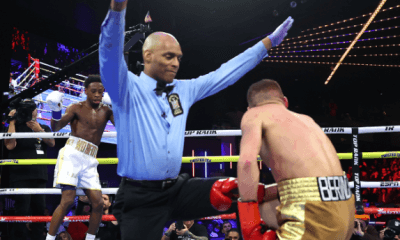
 Featured Articles1 week ago
Featured Articles1 week agoResults and Recaps from Madison Square Garden where Keyshawn Davis KO’d Berinchyk
-
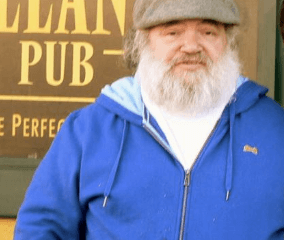
 Featured Articles3 weeks ago
Featured Articles3 weeks agoHall of Fame Boxing Writer Michael Katz (1939-2025) Could Wield His Pen like a Stiletto
-
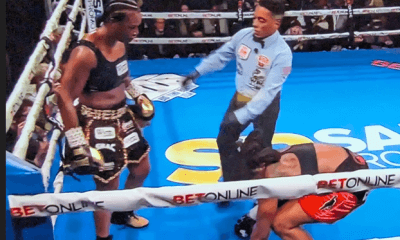
 Featured Articles3 weeks ago
Featured Articles3 weeks agoClaressa Shields Powers to Undisputed Heavyweight Championship
-
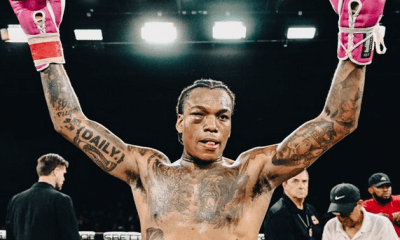
 Featured Articles4 weeks ago
Featured Articles4 weeks agoNajee Lopez Steps up in Class and Wins Impressively at Plant City
-
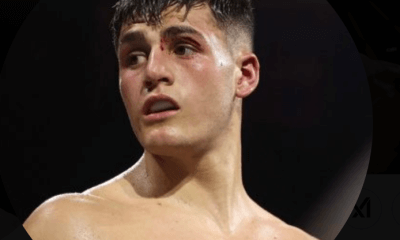
 Featured Articles1 week ago
Featured Articles1 week agoVito Mielnicki Hopes to Steal the Show on Friday at Madison Square Garden
-
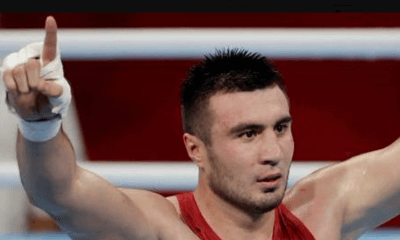
 Featured Articles3 weeks ago
Featured Articles3 weeks agoBakhodir Jalolov Returns on Thursday in Another Disgraceful Mismatch
-
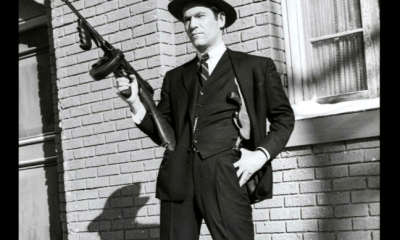
 Featured Articles2 weeks ago
Featured Articles2 weeks agoWith Valentine’s Day on the Horizon, let’s Exhume ex-Boxer ‘Machine Gun’ McGurn
-
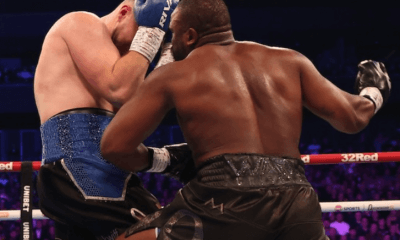
 Featured Articles2 weeks ago
Featured Articles2 weeks agoMore ‘Dances’ in Store for Derek Chisora after out-working Otto Wallin in Manchester





















